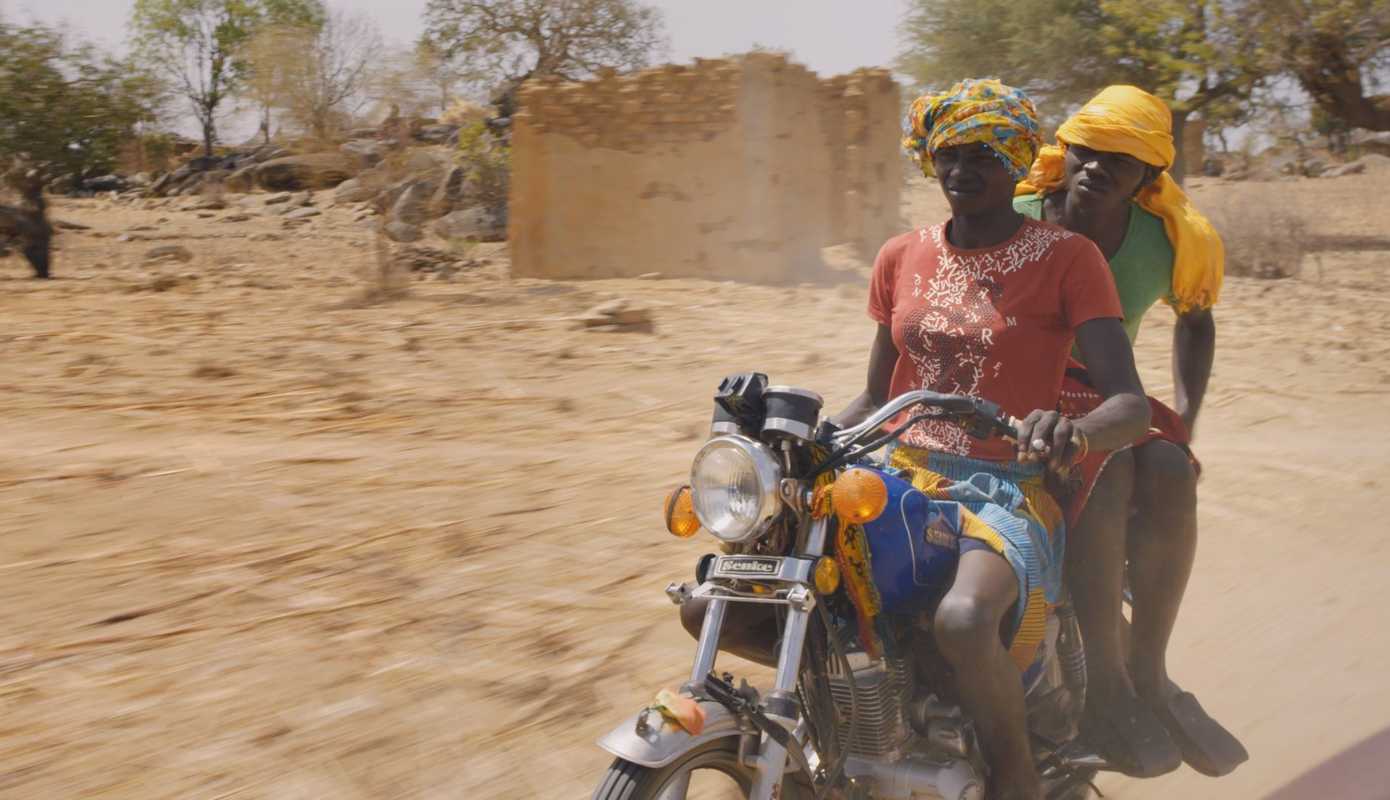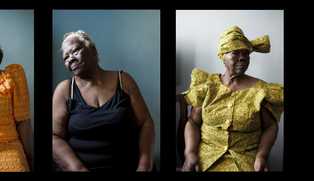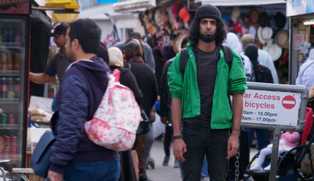Skin Deep’s Nkenna Akunna meets Sudanese writer and director hajooj kuka to talk about his latest film aKasha, a comically profound take on youth, rebellion, love and ideology in rebel-held Sudan.
*
Nkenna Akunna: Tell me a bit about your trajectory towards the making of this film. Is this a story you’ve always wanted to tell? How hard was it for you to make?
hk: I was living in rebel held areas in a war zone in the Nuba Mountains documenting life and the atrocities of war. Nuba has a harsh rainy season that brings the civil war to a halt due to mud that renders tanks and cars immobile. During this welcome break we started a youth centre that focused on drama and theatre that told stories of the oppressed. Over the two years we played theatre games, created numerous short theatre skits, and made four short films. We decided to make a feature film which I wrote based on the events going on around me. I then condensed it to tell the story over 24 hours, and only had a few characters on screen, but kept the absurd humour of living in a war zone.
The process was a beautiful experience that brought us all together and turned a village into a studio. But the impossible logistics of no electricity, running water or paved roads brought continuous and unexpected challenges. We ran into challenges like feeling nervous of being accused by the rebel authorities of searching for gold, because the sound guy’s equipment resembled a metal detector (which it does! And Nuba is rich with gold!)
 NK: I read somewhere that you found the actors for two of your leads, Adnan and Absi, outside of regular casting. What stood out to you about them?
hk: Absi, played by Ganja Chakado, was my first cast. The was he carries himself, dresses, walks and lives is art. I wrote the character based on him. Adnan, played by Kamal Ramadan, was our sound guy for all the short films and we noticed he only had side rolls in all our other productions so we made him the lead. Lina, played by Ekram Marcus, I met in a marketplace two years before the production and she struck me as a star.
NK: How is the film being received by African, particularly Sudanese audiences? Did you have any preconceived notions about what people may think?
hk: Sadly due to our military Islamic dictatorship in Sudan, media has basically been shut down since 1989 when they took power in a coup. So there is much excitement about having a feature film out and the hope is that this will be the first of many. Sudanese folks who were able to see the film in festivals were laughing and excited. We got mad love from them.
NK: Now onto the content of the film itself. As an audience, we are bearing witness to this world plagued by conflict, though that conflict, and the reasons for it, are rarely spoken. And there is no on-screen death. These seemed like extremely significant choices, ones that allowed me to really see the humanity in these characters who otherwise are so often depicted in two-dimensional ways. It is almost easy to forget the contextual reality of these characters’ lives. Can you talk a bit about your relationship with the Sudanese conflict, and how you see it showing up in civilians’ lives?
hk: To put it in context, in July 2016 I was covering one of the strongest offensives by the Sudanese government to eliminate the rebels. I covered the death of six children: the killing of a family by an air strike, the bombing of a hospital and a school, and walked among tens of dead bodies in the frontlines of the battle fields. Then the rain started, we switched to culture and music, and in November we started shooting aKasha.
The reality is we spend most of our time enjoying life to the max. We dance, play, gossip and think about a future for ourselves. War makes life ‘un-promised’ so it becomes more real. That said, this is an example of the other million narratives that need to be told. The war is the backdrop to a human story. The amazing Kenyan director Wanuri Kahiu came up with a film genre that I adopted called ‘afro-bubblegum.’ Which to me means deeply socially conscious films about us for us that are colourful and exciting.
NK: To take another more depressing path, the conflict is so present that is becomes part of the mundane. Everyday life is burdened by its weight. What can revolution mean to a man like Adnan? To Absi? To Lina? To Blues?
hk: On the surface aKasha is a 24 hour light humour adventure. The deeper layer is a questioning of the armed struggle and the need for a revolution. References to African revolutionaries are present throughout the film like Kuku Blues who wears a red beret in homage to Thomas Sankara while reading Frantz Fanon’s Wretched of the Earth. Then Lina talking about how her pan that makes food for the students is better than Adnan’s AK in reference to the Black Panther Party breakfast program. The film ends with Absi declaring that his musical instrument is a weapon meaning the revolution needs to go on and be won but the means needs to be creative.
NK: In Lina, you have a woman unafraid to speak her mind, a woman who wears tight clothes and makeup, and can expertly pull a gun on a male soldier. And she does not seem like an aberration in her environment. Her wants and needs may not be the same as her fellow women, but she is is still in fellowship with them. How did you conceive Lina’s character? What were you hoping to show audiences about women living through the conflict through her?
hk: Lina was the make-up artist in the film. She chose her clothing and jewellery. She is going through school and refusing to get married till she is done. So basically she is the character she plays. War changes the dynamics of society, and in Nuba women are central to the struggle and the backbone of the soldiers. Woman have a strong role in the Sudanese society dating back to our empires. Although held back by our Islamic dictatorship, strong women are always present.
NK: I read somewhere that you found the actors for two of your leads, Adnan and Absi, outside of regular casting. What stood out to you about them?
hk: Absi, played by Ganja Chakado, was my first cast. The was he carries himself, dresses, walks and lives is art. I wrote the character based on him. Adnan, played by Kamal Ramadan, was our sound guy for all the short films and we noticed he only had side rolls in all our other productions so we made him the lead. Lina, played by Ekram Marcus, I met in a marketplace two years before the production and she struck me as a star.
NK: How is the film being received by African, particularly Sudanese audiences? Did you have any preconceived notions about what people may think?
hk: Sadly due to our military Islamic dictatorship in Sudan, media has basically been shut down since 1989 when they took power in a coup. So there is much excitement about having a feature film out and the hope is that this will be the first of many. Sudanese folks who were able to see the film in festivals were laughing and excited. We got mad love from them.
NK: Now onto the content of the film itself. As an audience, we are bearing witness to this world plagued by conflict, though that conflict, and the reasons for it, are rarely spoken. And there is no on-screen death. These seemed like extremely significant choices, ones that allowed me to really see the humanity in these characters who otherwise are so often depicted in two-dimensional ways. It is almost easy to forget the contextual reality of these characters’ lives. Can you talk a bit about your relationship with the Sudanese conflict, and how you see it showing up in civilians’ lives?
hk: To put it in context, in July 2016 I was covering one of the strongest offensives by the Sudanese government to eliminate the rebels. I covered the death of six children: the killing of a family by an air strike, the bombing of a hospital and a school, and walked among tens of dead bodies in the frontlines of the battle fields. Then the rain started, we switched to culture and music, and in November we started shooting aKasha.
The reality is we spend most of our time enjoying life to the max. We dance, play, gossip and think about a future for ourselves. War makes life ‘un-promised’ so it becomes more real. That said, this is an example of the other million narratives that need to be told. The war is the backdrop to a human story. The amazing Kenyan director Wanuri Kahiu came up with a film genre that I adopted called ‘afro-bubblegum.’ Which to me means deeply socially conscious films about us for us that are colourful and exciting.
NK: To take another more depressing path, the conflict is so present that is becomes part of the mundane. Everyday life is burdened by its weight. What can revolution mean to a man like Adnan? To Absi? To Lina? To Blues?
hk: On the surface aKasha is a 24 hour light humour adventure. The deeper layer is a questioning of the armed struggle and the need for a revolution. References to African revolutionaries are present throughout the film like Kuku Blues who wears a red beret in homage to Thomas Sankara while reading Frantz Fanon’s Wretched of the Earth. Then Lina talking about how her pan that makes food for the students is better than Adnan’s AK in reference to the Black Panther Party breakfast program. The film ends with Absi declaring that his musical instrument is a weapon meaning the revolution needs to go on and be won but the means needs to be creative.
NK: In Lina, you have a woman unafraid to speak her mind, a woman who wears tight clothes and makeup, and can expertly pull a gun on a male soldier. And she does not seem like an aberration in her environment. Her wants and needs may not be the same as her fellow women, but she is is still in fellowship with them. How did you conceive Lina’s character? What were you hoping to show audiences about women living through the conflict through her?
hk: Lina was the make-up artist in the film. She chose her clothing and jewellery. She is going through school and refusing to get married till she is done. So basically she is the character she plays. War changes the dynamics of society, and in Nuba women are central to the struggle and the backbone of the soldiers. Woman have a strong role in the Sudanese society dating back to our empires. Although held back by our Islamic dictatorship, strong women are always present.
 NK: Adnan and Absi at many points in the film seem to be avoiding returning to their posts as soldiers, while telling themselves and everyone around them that they are not avoiding their responsibilities. They know what masculinity demands of them, and don’t want to admit that they are avoiding it. For me, this is a clear indication of how violent masculinity also hurts men.
hk: The film gives a glimpse of the complex fluidity that naturally exists in our society. Modern western-based war tactics demand masculinity as a drive: to die for one’s people. There are other ways to fight without needing this toxicity. I hope audience get a glimpse of how it is toxic and unrealistic.
NK: With your use of the edible flowers, both Lina at the meeting place and Adnan near the end of the film, I get a sense these characters are drawing on the power of a rooted, ancestral force. Can you talk about the significance of nature and its magical properties in the film?
hk: The purple and yellow flower flirt in the film! We all believe in our ancestors’ wisdom and knowledge, which includes the use of roots and spirits to guide us. The medicine woman on top of a mountain that sets our anti-heroes back on their path is a reflection of that.
NK: Later in the film, Adnan reveals that his honoured shooting down of a drone was actually a fluke. He doesn’t understand war strategy and he hates fighting. So what is it about Nancy that he loves?
hk: She gives him power and fame. Walking around with a powerful weapon like an AK-47 changes how one feels and how people look at each other. Let alone in the hands of the youth.
NK: Please tell me a bit about your plans for the future, AKasha and otherwise!
I am hoping aKasha will get the recognition it deserves so all the amazing folks who put their hearts into it are proud and hopefully can get paid! Personally I will continue using art to fight our corrupt capitalist Islamic military patriarchal systems in Sudan. But my next films, both fiction and documentary, are more Pan-African in their outlook. I am looking into adapting a disparaging book about immigration written by an Eritrean. I am also writing a script about future technologies placed in the hands of gender neutral African elders.
aKasha is screening as part of Film Africa at Rich Mix on Sat 10th Nov at 6.00pm.
NK: Adnan and Absi at many points in the film seem to be avoiding returning to their posts as soldiers, while telling themselves and everyone around them that they are not avoiding their responsibilities. They know what masculinity demands of them, and don’t want to admit that they are avoiding it. For me, this is a clear indication of how violent masculinity also hurts men.
hk: The film gives a glimpse of the complex fluidity that naturally exists in our society. Modern western-based war tactics demand masculinity as a drive: to die for one’s people. There are other ways to fight without needing this toxicity. I hope audience get a glimpse of how it is toxic and unrealistic.
NK: With your use of the edible flowers, both Lina at the meeting place and Adnan near the end of the film, I get a sense these characters are drawing on the power of a rooted, ancestral force. Can you talk about the significance of nature and its magical properties in the film?
hk: The purple and yellow flower flirt in the film! We all believe in our ancestors’ wisdom and knowledge, which includes the use of roots and spirits to guide us. The medicine woman on top of a mountain that sets our anti-heroes back on their path is a reflection of that.
NK: Later in the film, Adnan reveals that his honoured shooting down of a drone was actually a fluke. He doesn’t understand war strategy and he hates fighting. So what is it about Nancy that he loves?
hk: She gives him power and fame. Walking around with a powerful weapon like an AK-47 changes how one feels and how people look at each other. Let alone in the hands of the youth.
NK: Please tell me a bit about your plans for the future, AKasha and otherwise!
I am hoping aKasha will get the recognition it deserves so all the amazing folks who put their hearts into it are proud and hopefully can get paid! Personally I will continue using art to fight our corrupt capitalist Islamic military patriarchal systems in Sudan. But my next films, both fiction and documentary, are more Pan-African in their outlook. I am looking into adapting a disparaging book about immigration written by an Eritrean. I am also writing a script about future technologies placed in the hands of gender neutral African elders.
aKasha is screening as part of Film Africa at Rich Mix on Sat 10th Nov at 6.00pm.



